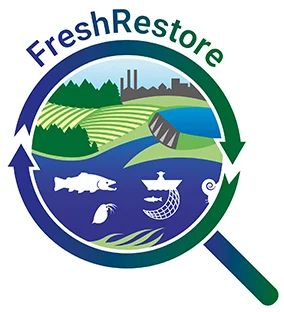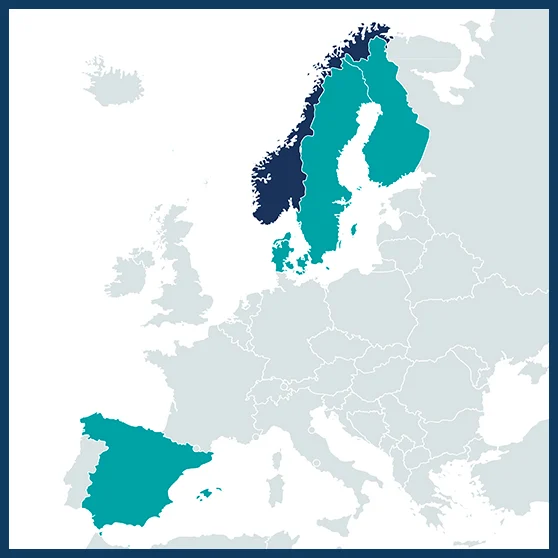
01.04.2022 – 01.04.2025
€ 1,249,026
Kim Magnus BÆRUM
kim.barum@nina.no
Coordinator: NINA Lillehammer, Norwegian institute for nature research, Trondheim, Norway
Environmental Science, environmental social science and geography, Aarhus University, Roskilde, Denmark
Biological and Environmental Science, University of Jyväskylä, Jyväskylä, Finland
Biology and Geology, Physics and Inorganic Chemistry, King Juan Carlos University, Móstoles, Spain
Ecology and Environmental Science, Umeå University, Umeå, Sweden

Freshwater ecosystems are under tremendous anthropogenic stress both at global (e.g. from climate change) and at catchment scales (e.g. from land and water use). A direct result is that freshwater ecosystems in general hold alarmingly many threatened species. This is not only problematic for biodiversity, but also for human prosperity as functional freshwater ecosystems provide a range of ecosystem services. These typically include recreation and tourism, water supply, water quality control, erosion prevention and food supply, among many. A key challenge of the 21st century is therefore to understand and predict how freshwater ecosystems respond to the suite of stressors, and concurrently how we can sustain and restore these systems at a large scale. FreshRestore aims to meet this challenge by integrating the understanding of multilevel changes in freshwater ecosystems and their surrounding landscapes with a socio-economic framework. This will allow coherent evaluation and mitigation of negative human impacts on lakes (e.g. via best practice solutions for land use), in order to support the ecosystem services provides to us people (e.g. recreational and commercial fisheries).
FreshRestore activities will answer four specific questions:
- How do anthropogenic stressors connect to ecological drivers across different spatial scales from local to European?
- How do anthropogenic stressors drive population size structure and biomass, and thus the functional ecology of fishes?
- How do natural and anthropogenic drivers interact to affect lake trophic diversity and functioning?
- What are the biological and socio-ecological trade-offs for nature-based solutions in face of both local and global stressors?
To achieve this, FreshRestore will structure and integrate statistical models upon existing datasets of biotic and abiotic parameters, fish population structure and ecological functions across large environmental gradients in Fennoscandia. The parameters will, among others, include climate, land and water use as well as restoration and mitigation efforts (e.g., habitat restorations, wetlands, regrowth of forest and buffer zones). An integrative modelling framework will provide valuable insights into how freshwater biodiversity is connected to the environment, how the outcome varies with anthropogenic stressors, and how these stressors can be mitigated to benefit both humans and ecosystems. The model concept will be transferred and tested with case studies in Spain.
FreshRestore will provide a quantification of the functional relationships between relevant units of natural ecological drivers and anthropogenic stressors across spatial scales. This will lead to new knowledge on the effects of environmental drivers and anthropogenic stressors on freshwater biodiversity. FreshRestore will also expand this knowledge with quantifications of how interactions between global and local anthropogenic stressors affect ecological functions which provide important ecosystem services in lakes. Furthermore, the project will identify, quantify and inform on the implementation of cost-effective nature-based solutions targeting local stressors. The outcomes will be interlinked so that the modelling framework provides the basis for an adaptive management process. This will provide a best practice tool-box where researchers and stakeholders (such as environmental agencies and policy makers at national scales, as well as owner and user associations and county administrative boards at the local scale) can work in synchrony to implement conservation and restoration actions in freshwater systems.
FreshRestore will develop scenarios and story maps of different mitigation solutions to support adaptive management and evidence-based decision-making at local and global scales. This facilitates effective revision of current policies and approaches (when needed), where the effects of specific mitigation efforts (e.g. change in land use) can be simulated to inform long-term effects on biodiversity and natural functioning of freshwater ecosystems.
We will use existing data, methods and competence from Fennoscandian lakes, comprising one of the largest remaining pristine freshwater sources in the boreal and Arctic regions, to produce novel mechanistic understanding of how local anthropogenic stressors and climate interactions affect biodiversity and functioning of freshwater ecosystems. The models will be tested and generalized within specific freshwater systems of southern Europe (Spain), where we will increase the current knowledge base on functional diversity with new field-collected data combined with already published data. An important aspect of the project is thus to transfer models and approaches, developed by the different partners, to new application contexts in the other countries. The project will facilitate sharing of knowledge and expertise between data- rich (Fennoscandia) and data-poor (Southern Europe) areas and thus provide a fruitful stepping stone for future projects focusing on fish populations and lake food webs and facilitating pan-European freshwater restoration and conservation efforts.
- The Research Council of Norway (RCN), Norway
- Innovation Fund Denmark (IFD), Denmark
- Academy of Finland (AKA), Finland
- State Research Agency (AEI), Spain
- Swedish Environmental Protection Agency (SEPA), Sweden